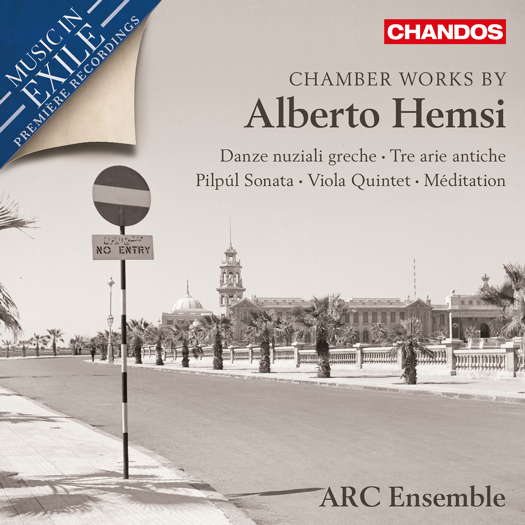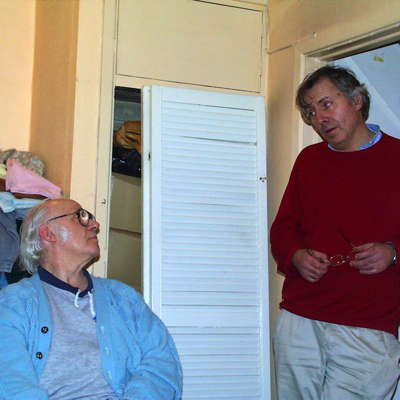 DISCUSSION: John Dante Prevedini leads a discussion about Classical Music and Politics, including contributions from Béla Hartmann and James Ross.
DISCUSSION: John Dante Prevedini leads a discussion about Classical Music and Politics, including contributions from Béla Hartmann and James Ross.

A Plethora of Influences
ROBERT McCARNEY roundly congratulates Chandos and all involved with this CD
'The playing by the various members of the ARC Ensemble is excellent throughout and the recording is crystal clear and atmospherically spacious.'
To my reckoning this is the sixth installment in Chandos' important, enterprising and warmly welcome Music in Exile series, that they have released in collaboration with Canada's ARC Ensemble over the last decade and as with previous discs in the series it would seem that the works presented here are receiving their first ever recordings.
Alberto Hemsi was a child of the Sephardim. For those who don't know, (and I don't have time or space here to do anything like justice to their tragic, extraordinarily rich and fascinating story), the Sephardim is the modern day diaspora scattered all over the old and new world of people who descend from Jews expelled from the combined territories of Castile and Aragon, on pain of death or conversion, in 1492. From about a thousand years ago until the Nazi holocaust you would do well to find a decade in European history when Jews were not expelled, (and this does not include the frequent pogroms), from somewhere or other. Usually these were small scale affairs, typically cynical attempts by rulers to get money by allowing Jews back in if they paid appropriately. Or to win over antisemitic public favour for some new unpopular decree or tax. In this context Edward I's wholescale expulsion of the Jews from England in 1290 stands out. That said, what made the Alhambra Decree promulgated by Ferdinand and Isabella so horrific and its consequences so vast is that nowhere in Europe at the time had the sheer numbers of Jews as did Castile and Aragon and their colonies at the time (notably Sicily), and nowhere else did they form such an integral part of the society at every level and had done so for up to a thousand years in some parts. For those who moved to Portugal they suffered the same fate a few years later.
In a way similar to how European Jews in the 1920 and 30s who had the foresight, money, connections or sheer luck to escape the criminal, murderous Nazi madness enriched British and especially North American society in incalculable ways, there were European states in the sixteenth century only too happy to take advantage of the Jews streaming out of Iberia. Many went to (non Aragonese) Italy but the two states that benefited the most were the United Provinces of the Dutch Republic especially when they gained their independence after an eighty-year war with Castile and also to a great extent the Ottoman Empire which is where Alberto Hemsi was born in modern day Turgutlu in Aegean Anatolia.
Growing up where he did he was exposed to multiple and varied influences. He would have had a traditional religiously Jewish upbringing but being Sephardi he would also have heard and spoken Ladino which is the traditional Sephardic language, basically a form of Spanish that hasn't changed much with the exception of Hebrew additions and new vocabulary picked up along its various European and Mediterranean adventures since the time of the Iberian expulsion. Many of his neighbours would have been Armenians and especially Greeks. He received a French style education. He went to study in Italy when he earned a music scholarship and while there he fought in the First World War as an Italian soldier and earned medals for conspicuous bravery.
At the end of the First World War with the collapse of the Ottoman Empire and the birth of modern Turkey which resulted in the infamous 'population exchanges' between Greece and Turkey, Hemsi moved to Rhodes which was at the time under Italian control. In 1928 he moved to Alexandria where despite being an Italian citizen he evaded the risk of internment while the city was under British occupation during the Second World War and he was forced into exile one more time after the Suez crisis and Israel's subsequent invasion of Sinai. A state of affairs that made being Jewish in Egypt persona non grata and this time he and his family moved to Paris where after two decades of contributing notably to cultural life there he died in 1975.
From this extraordinary but far from uncommon story, I hope you can imagine the plethora of influences that went into making the music of Alberto Hemsi. He wanted to do with his Jewish specifically Sephardic musical heritage something similar to what Bartók had done with his Hungarian or wider Balkan sources. To be true to that music but at the same time be true to himself as a twentieth-century composer who had received an excellent and fully European musical education but one with the addition of Turkish, Greek, Armenian, Jewish and Ladino inflections.
If Hemsi is known at all today, it is for his numerous Coplas Sefardis. The copla is still popular in Spain if nothing like as much as it was in its heyday during the Francoist dictatorship when it also had a notable presence in Spanish cinema. It's basically a ballad form that typically tells tales of lives and loves from the wrong side of the tracks with, for want of a better word, a broadly Andalusian sound. Hemsi's coplas like all music written in exile have a marked quality of longing to my ears. Three of them are arranged here for string quartet. The way he blends the traditional melodies with anything but traditional harmonies is extremely enticing. Sample the ravishingly rich Canzone with its aching sliding notes contrasted with rhythmic pizzicato, not surprisingly labelled nostalgico.
Listen — Alberto Hemsi: Canzone (Tre arie antiche, Op 30)
(CHAN 20243 track 5, 0:00-0:51) ℗ 2022 Chandos Records Ltd :
The biggest piece on the CD is the String Quintet from the war years in Alexandria which includes two violas, one of them more or less in a concertante role. This is the least typical of the works on the CD. Indeed listening blind you would be surprised to learn it was by the same composer as the rest of the works on the album. The most memorable of its four movements is the Berceuse.
Listen — Alberto Hemsi: Berceuse (Quintet in G, Op 28)
(CHAN 20243 track 12, 0:00-0:55) ℗ 2022 Chandos Records Ltd :
The last track, a melancholy meditation for cello and piano in Armenian style has us back in that extraordinary melting pot of cultures, faiths and languages which was the air that Hemsi breathed all his life and gave voice to in his music and in this sense it is a suitable way to end the programme.
Listen — Alberto Hemsi: Méditation Op 16)
(CHAN 20243 track 14, 5:37-6:36) ℗ 2022 Chandos Records Ltd :
There is nothing as radical as anything by Bartók, for example, on this CD. I thought of Enescu and Szymanowski (especially in the Pilpúl Sonata for violin and piano), maybe Skalkottas, even John Foulds when listening to the various compositions. The string quartet pieces reminded me of Schulhoff more than anyone else. So although I had hoped for something more original and memorable from this composer, I enjoyed this CD and am glad to have made Hemsi's acquaintance.
The playing by the various members of the ARC Ensemble is excellent throughout and the recording is crystal clear and atmospherically spacious. The liner notes, apart from being almost illegible in their minuteness, are informative and well written. They are in English, German and French but I think it is a real shame for a Sephardic composer that there is not also a version in Spanish. The cover of the CD is a tastefully chosen black and white photo of Alexandria from 1950. I am not sure if the Eliyahu Hanavi synagogue is visible, if it is it would be even more fitting. The CD runs to barely more than an hour which is disappointing as is the fact that most of the pieces are relatively small scale. I say that not knowing how much chamber music, especially large scale chamber music, by Hemsi there is but if he has any string quartets for example this CD would have been the perfect opportunity to present them. To close, any minor misgivings apart, Chandos and all involved with this CD are to be roundly congratulated. If this disc does anything to raise the profile of Alberto Hemsi and Sephardic culture in general it can only deserve the highest praise.
Copyright © 17 September 2022
Robert McCarney,
León, Spain

CD INFORMATION - ALBERTO HEMSI: CHAMBER WORKS
READ GEOFF PEARCE'S REVIEW OF THIS CD



